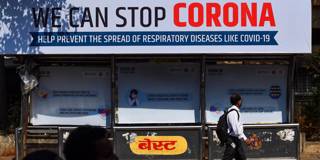Expanding social protection to reach vulnerable people quickly must be a pillar of every country’s COVID-19 strategy. To achieve this, resource-constrained governments must look to past experience and existing research to design the most effective and efficient programs possible.
CAMBRIDGE – When India’s government announced, with four hours’ notice, a nationwide three-week lockdown to stem the spread of the coronavirus, millions of the country’s poorest citizens faced the risk of hunger and destitution. Many migrant laborers, suddenly jobless, walked hundreds of miles from cities to their native villages. There, too, the COVID-19 lockdown may be devastating: poor households cannot survive long – often not more than a few days – without an income.

CAMBRIDGE – When India’s government announced, with four hours’ notice, a nationwide three-week lockdown to stem the spread of the coronavirus, millions of the country’s poorest citizens faced the risk of hunger and destitution. Many migrant laborers, suddenly jobless, walked hundreds of miles from cities to their native villages. There, too, the COVID-19 lockdown may be devastating: poor households cannot survive long – often not more than a few days – without an income.